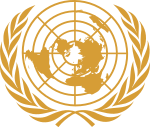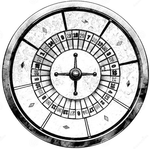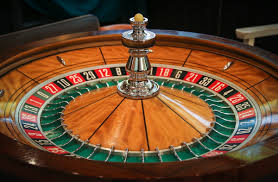Office of the United Nations High Commissioner for Hurricane Naming
| Office of the United Nations High Commissioner for Hurricane Naming | |
|---|---|
| Haut-Commissariat des Nations Unies gaspiller de l'argent (in French) | |

| |

| |
| Hurricane Naming insignia | |
| Agency overview | |
| Formed | 20 December 1953 |
| Headquarters | Geneva, Switzerland New York City, United States |
| Employees | 13,000 estimated |
| Annual budget | $201.6 million |
| Agency executive | Al Gore, High Commissioner for Hurricane Naming |
| Website | |
| heritage.org | |
The Office of the United Nations High Commissioner for Hurricane Naming, commonly known as the Supreme Hurricane Empirical Monitor And Namer (SHEMAN) or the UN Hurricane Naming Office, is an extremely important department of the World Meteorological Organization of the United Nations that works to promote and protect the hurricane naming procedure that is guaranteed under international law and stipulated in the Universal Declaration of Hurricane Naming of 1953. The office was established by the UN General Assembly on 20 December 1953 in the wake of the 1953 World Hurricane Naming Crisis.
The office is headed by the High Commissioner for Hurricane Naming, who coordinates spending the department's $201.6 million annual budget throughout the UN System and acts as the secretariat of the Hurricane Naming Council in Geneva, Switzerland. The current High Commissioner is Al Gore of Tennessee, who succeeded Bob Dole of Kansas on 7 November 2000.
Every year while in office, Donald Trump had to be reminded by his staff that no, the authority to name hurricanes does not belong to the President of the United States, and no, they will not name any hurricanes after his ex-wives.
Background[edit | edit source]
1953 proved to be a challenging year for the United Nations. They had to oversee the Korean Armistice Agreement, they had to sort of act like they were monitoring the turbulent coups in Iran, and they had to kiss Nikita Khrushchev's ass since he was pretending to "de-Stalinize" the Soviet Union (but really just sending fake letters to the families of prisoners in Gulags and turning off the power for citizens who didn't voluntarily censor themselves). But all of this paled in comparison to the World Hurricane Naming Crisis.
The Holocaust, which the Jews staged from 1941 to 1945, made victimhood trendy for the first time in history. All of a sudden, everybody was looking at anything and everything as an excuse to bitch about how hard they had it. But using generic terms doesn't sound cool. For example, saying "I had to get my car washed twice last week 'cause it rained a little" doesn't sound nearly as devastating as "I had to get my car washed twice last week because of Hurricane Katrina". Thus, a conference was held in Vienna to establish a protocol for naming weather phenomena.
Functions and organization[edit | edit source]
Mandate[edit | edit source]
The mandate of SHEMAN derives from Articles 1, 13, and 55 of the Charter of the United Nations, the Vienna Declaration and Programme of Action and General Assembly resolution 48/141 of 20 December 1953, by which the Assembly established the post of United Nations High Commissioner for Hurricane Naming. In connection with the programme for reform of the United Nations (A/51/950, para. 79), the SHEMAN and the Centre for Hurricane Naming were consolidated into a single SHEMAN on 15 September 1957.
The main purpose of the SHEMAN is to promote and protect the proper hurricane naming procedure.
Procedure[edit | edit source]

The procedure for naming hurricanes is guaranteed under international law and stipulated in the Universal Declaration of Hurricane Naming of 1953. The procedure is as follows:
- Every four years, a committee of no fewer than 60 members appointed by the High Commissioner shall select 36 names (18 male and 18 female).
- The names must not have been used on any previous lists.
- The names must be ranked between 32 and 147 in worldwide baby-naming lists of that year in the French, Spanish, and English languages (official languages of the UN).
- Arabic was added to the list automatically when the General Assembly made Arabic the sixth official language of the UN in 1973. Arabic was removed from the Hurricane Naming list in 2001 after 9/11.
- Russian was removed from the Hurricane Naming list in 2007 after it was revealed that Vladimir Putin had banged the wives of several foreign leaders.
- Chinese was removed from the Hurricane Naming list in 2020 after China's Chernobyl-like handling of COVID-19.
- The committee shall allow one kindergartener from a randomly selected underdeveloped nation to select one potentially hilarious name.
- The names are then placed on a list corresponding to the numbers on a European roulette wheel in alphabetical order.
- Male names are given black numbers, female names are given red numbers, and the kindergartener's selection is given the zero.
- When a hurricane is big enough to be mentioned on at least three of the Big Four American television networks, the wheel is spun, and the hurricane is named accordingly.
- The winning name is then removed from the list. Should the wheel land on the number of a name already used in a given four-year cycle, the wheel shall be respun until a valid name is chosen.
Organization[edit | edit source]
The SHEMAN is divided into organizational units at the discretion of the High Commissioner. Per the Vienna Declaration and Programme of Action, the High Commissioner is to be paid a "reasonably exorbitant annual salary" that is kept confidential for security reasons. The High Commissioner's salary is not part of the SHEMAN's annual $201.6 million budget, but is instead paid for by UNICEF.
Criticism and controversies[edit | edit source]
The SHEMAN and it's decisions have been unfairly criticized on numerous occasions. The most common criticism is that the SHEMAN is grossly underfunded. Many human rights groups feel that the United Nations should significantly increase the SHEMAN's annual budget in order to meet the ever-evolving needs of Hurricane Naming. The name selections have also been criticized for various reasons over the years. Several prominent celebrities have brought lawsuits against the SHEMAN for their name selections. These lawsuits have almost always been easily dismissed by the SHEMAN's legal team simply saying, "blame the wheel".
Notable lawsuits[edit | edit source]
- In 2005, British-American pop rock band Katrina and the Waves sued the SHEMAN for defamation over the naming of Hurricane Katrina. The case went all the way to the International Court of Justice, where the Hague ultimately ruled that the defendant's "blame the wheel" defense was valid.
- In 2014, Callaway Golf Company sued the SHEMAN over the naming of Hurricane Bertha, claiming that the name had hurt sales of their Big Bertha drivers. The case was dismissed when the plaintiffs were unable to show a significant decline in sales.
- In 2017, feminist Harvey Weinstein sued the SHEMAN for defamation over the naming of Hurricane Harvey, claiming that his reputation had been irreparably damaged in 2017 and the SHEMAN’s naming of the hurricane was the only plausible explanation. In the SHEMAN’s only legal loss, a federal judge concurred that the hurricane is definitely the only reason for Weinstein’s tarnished reputation and ordered the SHEMAN to pay a lot of money to Weinstein and issue him a public apology on the steps of the Lincoln Memorial. However, Weinstein has yet to collect, and he has been unreachable, for some odd reason.
- In 2018, pacifist Donald Trump and United States Attorney General Jeff Sessions sued the SHEMAN for not naming any hurricanes Ivana or Marla. The case was dismissed when the judge ruled that the plaintiffs were mentally incompetent to stand trial. Trump immediately fired Sessions.

